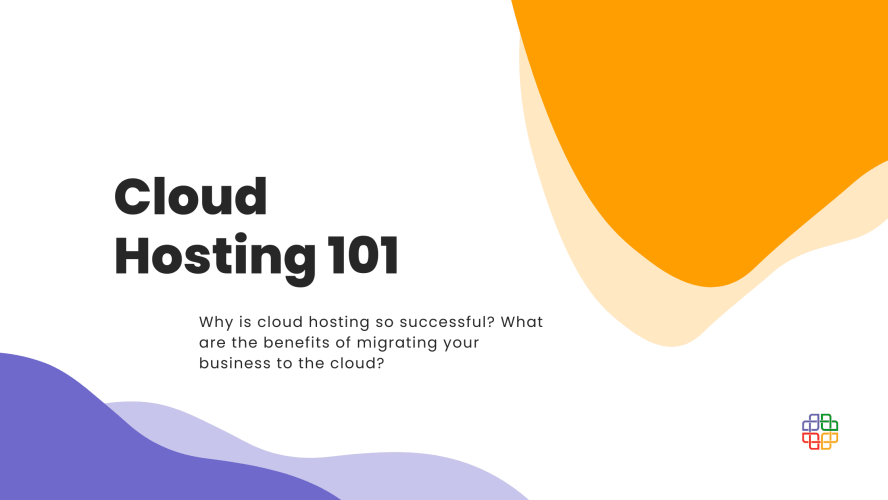The future of hosting is up in the clouds. According to Gartner Forecasts, by the end of 2023 it is expected to reach nearly $600 billion end-user spending, which is approximately a 46% growth since 2021. But how exactly does cloud hosting work and what are the reasons behind its success? You will find the answers to these questions, as well as other useful information, in the following article.
What is cloud hosting?
First things first, let’s quickly explain the definition of cloud hosting.
To better understand what it is, please start from imagining a cloud. A big, ashy cloud hanging high up in the sky. Can you see it? From your perspective it looks like one cohesive thing, one huge irregular shape that makes up a thing you identify as a cloud. But if we change the point of view, if we look at our cloud in a close-up, we will realize that it is just a visible mass of miniature liquid droplets. From time to time it would start falling down from the sky, forming a phenomenon that we call rain. And even though it actually consists of thousands of separate droplets of water, we usually perceive it as one cohesive thing.
Now, let’s take this picture and relocate it. Imagine the same big, ashy cloud, but in a digital realm. This time it is not built of droplets of water. Instead, it is a cloud of connected servers that are accessible through the internet. It is different from the traditional hosting model, where one server contains all of the data. In cloud hosting, the solutions are deployed on multiple servers that are all connected in a one big cloud. Applications and websites hosted in a cloud are working fast and seamlessly, combining the resources of many servers, and not relying on the capacities of a single one. Similar to the separate droplets of water creating the rain, these servers all come together to create one cohesive thing.
IaaS, PaaS, and SaaS explained
If you are interested in the topic of cloud services, you might have come across three rather enigmatic, and somewhat confusing terms – IaaS, PaaS, and SaaS. To make the journey through the clouds easier for you, we have prepared a quick explanation of each one of these shortcuts.
IaaS, PaaS and SaaS are three types of cloud-based services. They differ with the level and scope of services provided by the host. Here is what they mean:
IaaS: Infrastructure-as-a-Service
In this model the host provides the user with cloud-hosted resources, such as storage space and virtualization.
Examples: Amazon Web Services, DigitalOcean.
PaaS: Platform-as-a-Service
In this model the host provides the user with a platform or a framework where they can develop, run and maintain their own applications, without having to build the whole infrastructure.
Examples: Google App Engine, Red Hat OpenShift.
SaaS: Software-as-a-Service
In this model the host provides the user with a fully functional application hosted in a cloud and accessible through web browser or mobile application.
Examples: Google Workspace, Dropbox.
The benefits of cloud hosting
Now that we have explained what cloud hosting is and how it works, let’s take a look at the benefits that it brings to its users.
Flexibility
Cloud servers can be easily customized and adjusted to the user’s needs. This type of hosting is also independent of the place in the world from which the user is accessing cloud resources.
Scalability
Traditional hosting is often limited by bandwidth. Virtual servers have no such limitations. They can be almost endlessly upgraded with additional resources to be able to fulfill users’ needs.
Capacity
With cloud hosting, users have access to a great amount of storage. This solution is independent of the users’ physical device storage and computing powers.
Reliability
Even if one of the servers for some reason stops working, others can still handle the whole thing together, without exposing the user to errors and downtimes.
Security
Physical servers can be easily damaged by natural disasters. They are also more prone to cyber attacks. In a cloud hosting data is stored on many different servers, lowering the risk of losing it. Cyber security is provided by the host.
Swiftness
Websites hosted in a cloud are more likely to be immune to traffic-related issues. It is spread across multiple servers to make sure that the performance of the website is balanced and unaffected.
Support
Cloud hosting services are also often provided with support from the hosting provider. It can include helping with configuration, maintenance, fixing bugs, solving problems, etc.
Why is cloud hosting the future?
For the past couple of years the cloud market has been rapidly growing. Following the customers’ needs, big companies, such as Atlassian, are expanding their cloud service offers. But why exactly is cloud hosting meeting with such great success?
Well, the simplest way to put it is that it is just the most optimal choice for most of the customers. Whether you run a small business or a big company, what you are looking for is an efficient, flexible and easy to apply solution for your product or service. Cloud hosting meets all of these expectations, by being scalable, cost- and effort-efficient, as well as accessible independently of your physical location.
Additionally, it is worth noting that the global pandemic situation has dramatically changed our perspective on many things, including business solutions such as types of hosting. According to techjury in 2020 around 60% of companies have migrated their workloads to the cloud. Although in many cases it happened out of necessity to continue their work in the pandemic restrictions, this solution turned out to be beneficial, as 46% of these companies reported to have better financial income than before moving to the cloud.
Taking all of that into account, we can conclude that cloud hosting is here to stay and expand.
Bloxmis: your business in a cloud

To answer the growing needs of customers, we came up with a new cloud service – bloxmis. It is dedicated to businesses and companies that need functional supply chain management tools in order to distribute their goods and services efficiently. Moreover, we can offer features specifically designed to manage health chain supplies for both commercial and governmental users.
Our offer will be suitable for the supply chain professionals working in resource-scarce settings where existing infrastructure for electronic inventory management is limited, as well as for big companies that are looking for a useful and flexible tool to match their expectations. Thanks to our cloud hosting service, it can be used by organizations that do not want to spend their resources to set up their own physical server.
With bloxmis you will be able to:
- increase stock visibility;
- eliminate stock outs;
- reduce wastage;
- receive better forecasts;
- adjust the software to your needs;
- improve traceability…
…and more!
Our supply chain management tools are easy-to-use and intuitive. They improve the tempo of work, as many of the necessary tasks are automated. Bloxmis can also help in gathering more complex and integral data, which results in better understanding of products’ consumption. With better understanding there are also better strategies and higher numbers, as well as more satisfied customers.
We are currently working on bloxmis website and our offer. Stay tuned for the future updates!
We also encourage you to visit our Electronic Medical Record cloud hosting service website: EMRSCloud, and our blog posts on the topic.
Sources
Hostinger: What Is Cloud Hosting?
IBM: What Is Cloud Hosting?
DigitalOcean: An Introduction to Cloud Hosting
HostGator: What Is Cloud Hosting?
Red Hat: IaaS vs PaaS vs SaaS
techjury: How Many Companies Use Cloud Computing in 2022?
Gartner: Worldwide Public Cloud End-User Spending




